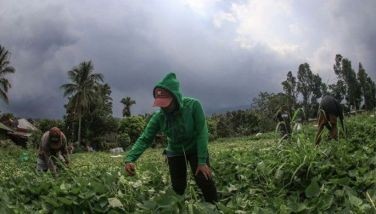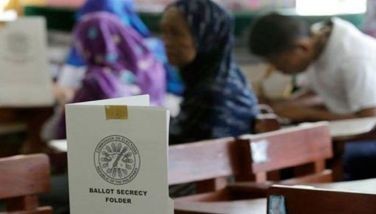PNP assistance centers set up for ’04 polls
December 17, 2003 | 12:00am
The Philippine National Police (PNP) has set up "monitoring and assistance centers" at its regional and provincial offices as part of security measures implemented at the start of the election season.
Last Monday, the Commission on Elections began accepting the candidacies of those who wish to run for public office in the May general elections, signaling the start of the election season.
Chief Superintendent Victor Luga, head of the PNP directorate for police community relations, said the centers, which will be manned 24 hours a day, are meant to enable Camp Crame to keep an eye on the security situation across the country.
The centers have been instructed to immediately inform the PNP main headquarters of election-related incidents.
The PNP has started identifying areas that need stricter security measures as well as assessing the security needs of potential hot spots or areas that have a history of election-related violence or "intense political rivalry," Luga said. He did not identify any areas.
PNP chief Director General Hermogenes Ebdane put the force on alert last Monday to implement the Comelec-imposed gun ban. The alert will last until the end of the election period on June 9 next year.
Permits to carry firearms outside residence remain suspended during the election period unless an exemption is issued by the Comelec.
Those with threats to their lives may be allowed to carry firearms after authorities have assessed the threats.
Areas where the communist New People’s Army (NPA) are known to be active are of concern to the PNP, Luga said.
Every election, the rebels extort money from local politicians in exchange for safe passage or permission to campaign in certain areas where they have a presence.
President Arroyo has ordered the military and the police to stop the NPA. "The people’s right to vote and freedom of choice must be unimpaired at all times," she said in a statement issued by Malacañang.
The NPA is the armed wing of the Communist Party of the Philippines. The CPP, which has been waging an insurgency for the past 30 years, is considered a terrorist organization by the United States along with the NPA.
Meanwhile, Ebdane also implemented a so-called "one positive strike" policy as part of the Arroyo administration’s ongoing campaign against illegal gambling.
"All police commanders are hereby directed to stop and clamp down on illegal gambling, particularly jueteng, and conduct sustained and intensified operations against illegal gambling," Ebdane said in a written directive to police chiefs and commanders.
"Given the long-standing campaign against the illegal numbers game, one positive strike in their area can and will lead to the relief of the commander concerned."
Despite repeated government campaigns against jueteng, the illegal numbers game continues to thrive because local officials and the police reportedly have taken bribes to turn a blind eye.
Also, politicians are widely believed to be receiving huge political campaign donations from illegal gambling barons during elections.
Even the President had been loosely linked in the past to a drug baron based in her home province of Pampanga. Mrs. Arroyo denied the allegations.
Jueteng led to the downfall of former President Joseph Estrada, who was toppled in a military-backed popular protest in January 2001 due largely to allegations that he was receiving bribes from jueteng operators.
In June 2002, the National Police Commission sacked seven senior police officials for their failure to curb jueteng, which operate like mini lotteries.
Last Monday, the Commission on Elections began accepting the candidacies of those who wish to run for public office in the May general elections, signaling the start of the election season.
Chief Superintendent Victor Luga, head of the PNP directorate for police community relations, said the centers, which will be manned 24 hours a day, are meant to enable Camp Crame to keep an eye on the security situation across the country.
The centers have been instructed to immediately inform the PNP main headquarters of election-related incidents.
The PNP has started identifying areas that need stricter security measures as well as assessing the security needs of potential hot spots or areas that have a history of election-related violence or "intense political rivalry," Luga said. He did not identify any areas.
PNP chief Director General Hermogenes Ebdane put the force on alert last Monday to implement the Comelec-imposed gun ban. The alert will last until the end of the election period on June 9 next year.
Permits to carry firearms outside residence remain suspended during the election period unless an exemption is issued by the Comelec.
Those with threats to their lives may be allowed to carry firearms after authorities have assessed the threats.
Areas where the communist New People’s Army (NPA) are known to be active are of concern to the PNP, Luga said.
Every election, the rebels extort money from local politicians in exchange for safe passage or permission to campaign in certain areas where they have a presence.
President Arroyo has ordered the military and the police to stop the NPA. "The people’s right to vote and freedom of choice must be unimpaired at all times," she said in a statement issued by Malacañang.
The NPA is the armed wing of the Communist Party of the Philippines. The CPP, which has been waging an insurgency for the past 30 years, is considered a terrorist organization by the United States along with the NPA.
Meanwhile, Ebdane also implemented a so-called "one positive strike" policy as part of the Arroyo administration’s ongoing campaign against illegal gambling.
"All police commanders are hereby directed to stop and clamp down on illegal gambling, particularly jueteng, and conduct sustained and intensified operations against illegal gambling," Ebdane said in a written directive to police chiefs and commanders.
"Given the long-standing campaign against the illegal numbers game, one positive strike in their area can and will lead to the relief of the commander concerned."
Despite repeated government campaigns against jueteng, the illegal numbers game continues to thrive because local officials and the police reportedly have taken bribes to turn a blind eye.
Also, politicians are widely believed to be receiving huge political campaign donations from illegal gambling barons during elections.
Even the President had been loosely linked in the past to a drug baron based in her home province of Pampanga. Mrs. Arroyo denied the allegations.
Jueteng led to the downfall of former President Joseph Estrada, who was toppled in a military-backed popular protest in January 2001 due largely to allegations that he was receiving bribes from jueteng operators.
In June 2002, the National Police Commission sacked seven senior police officials for their failure to curb jueteng, which operate like mini lotteries.
BrandSpace Articles
<
>
- Latest
- Trending
Trending
Latest
Trending
Latest
Recommended






























